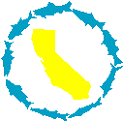CSPA |
| Your 501(c)(3) tax deductible cash donations are desperately needed if the fight for our fisheries is to continue. Read how you can donate! |
 Enter your Email address to sign up Enter your Email address to sign up for our Weekly Newsletter For Email Marketing you can trust |
More News
![]()
 Groups Demand Strong Groundwater Testing Program for Dairies in California’s Central Valley
Groups Demand Strong Groundwater Testing Program for Dairies in California’s Central Valley
Advocates Petition Water Quality Control Board to Improve Monitoring Program
December 9, 2009 -- Rancho Cordova, Calif. – Food & Water Watch, Community Water Center, the California Sportfishing Protection Alliance and four other organizations delivered a petition today to California’s Central Valley Regional Water Quality Control Board (the Board) asking the Board to strengthen its groundwater-monitoring program around the region’s dairies. As currently written, the program fails to test for several major contaminants that threaten public health and the environment.
The Board regulates waste management on roughly 1,600 Central Valley dairies, which together house as many as 2 million mature dairy cows. The cows produce 50 million tons of waste per year. Groundwater contamination from dairy cow waste is widespread in the Central Valley; the waste is not treated, but instead stored in giant earthen "lagoons" and spread on cropland, where it can leach into groundwater.
"Each year, dairies in the Central Valley produce eight times as much waste as the city of Los Angeles,” said Food & Water Watch Researcher and Policy Advocate Elanor Starmer. “It wasn't until 2007 that the Central Valley water board imposed any waste management requirements on dairies at all. Two years into the new program, we need to know whether it is reducing groundwater pollution."
Ninety percent of Central Valley communities are dependent on groundwater as their drinking water source, and many of these communities are facing illegal levels of dangerous contaminants in their drinking water from groundwater contamination. The sources of this contamination have not been adequately investigated, despite the huge impacts on public health and the environment.
“Many of the Central Valley’s poorest communities have already been forced to live without safe drinking water as a result of the state’s failure to protect groundwater quality,” said Britton Schwartz, legal consultant with the Community Water Center. “Our communities need this dairy monitoring program to be as effective as possible to prevent further groundwater contamination.”
This month, the Board is initiating a program to test the groundwater underneath many of the region's largest dairies. If implemented properly, the monitoring program will provide stakeholders with a needed assessment of the extent of dairy waste pollution in groundwater and the risks it poses to public health and the environment. It will also tell the public whether the Board’s efforts to regulate dairy waste management are successfully reducing groundwater contamination or whether stronger measures are needed.
However, the Board’s monitoring program as currently written fails to test for several major contaminants—including antibiotics, hormones and pathogens such as E. coli—that threaten public health and the environment. The program also fails to provide clear testing guidelines to dairies. Several changes must be made to the program, including testing for all major contaminants associated with dairy waste; the proper placement of monitoring wells; and testing at the times of year when groundwater is at greatest risk of being contaminated with dairy waste to ensure an adequate characterization of the extent of degradation and pollution.
“It’s alarming that in 2010 the Regional Board, charged with protecting California’s precious groundwater resource, does not know the extent and degree of pollution,” said Richard McHenry, an engineer with the California Sportfishing Protection Alliance. “Proper and full monitoring will identify the extent of the problem. It is necessary, but not a solution.”
The groups that presented the petition to Central Valley Regional Water Quality Control Board Executive Officer Pamela Creedon include Food & Water Watch, Community Water Center, Environmental Law Foundation, California Sportfishing Protection Alliance, California Rural Legal Assistance Foundation, Clean Water Action and Southern California Watershed Alliance. The petition can be viewed at http://documents.foodandwaterwatch.org/CV-MRP-proposal-1209.pdf
Food & Water Watch, a nonprofit consumer organization based in Washington, D.C., works to ensure clean water and safe food in the United States and around the world. We challenge the corporate control and abuse of our food and water resources by empowering people to take action and transforming the public consciousness about what we eat and drink. For more information, visit www.foodandwaterwatch.org.
Community Water Center, a nonprofit organization based in Visalia, CA, seeks to ensure that all communities have access to safe, clean and affordable water. Our mission is to create community-driven water solutions through organizing, education and advocacy in California’s San Joaquin Valley.
Founded in 1983, the California Sportfishing Protection Alliance (CSPA) was formed to protect, restore and enhance the state’s fishery resources and the aquatic ecosystems they depend on to ensure this renewable public resource is conserved for the public’s use and that of future generations.